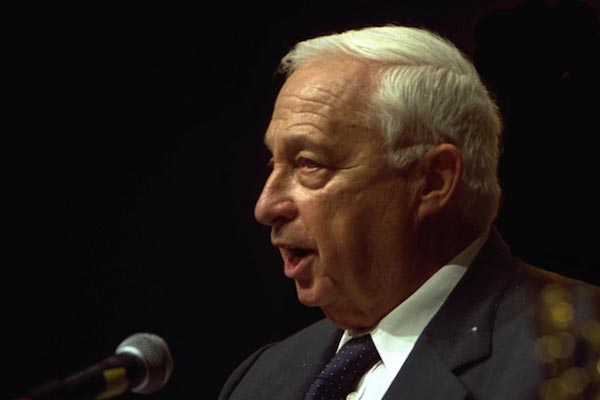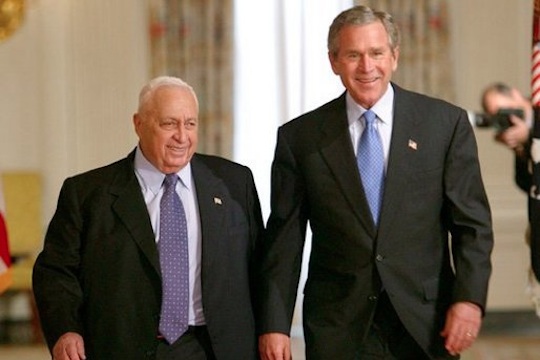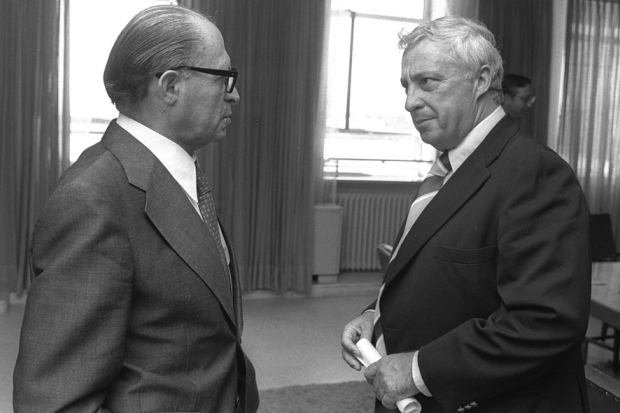Israel’s former prime minister Ariel Sharon, who spent the last eight years comatose after a series of strokes, died on Saturday, January 11. He was 85 years old.

A general, politician, statesman, and to many a notorious war criminal, Ariel Sharon was known to combine dogged personal ambition with strategic acumen and ruthlessness, which together shaped one of the most controversial and remarkable careers in Israeli political history. Born in the community of Kfar Malal in 1928, Sharon joined the Haganah in the mid 1940s, and first saw action in the run-up to the 1948 War, when his unit staged raids against Arab villages around Kfar Malal. He was seriously wounded in the battle of Latrun and temporarily left the army in 1949 to study at the Hebrew University. By personal order of David Ben-Gurion, however, Sharon was recalled to military service and asked to head the newly established Unit 101.
The unit was created specifically for the purpose of retaliatory raids against Palestinian refugee guerrillas who operated across the Jordanian and Egyptian borders. As often as not, the attacks were against civilian targets, including refugee camps and villages in the Egyptian-occupied Gaza Strip and Jordanian-occupied West Bank. One such raid, on the village of Qibya in 1953, culminated in a massacre of 69 civilians who were gunned down as they tried to escape their homes or were buried under the rubble of detonated buildings. The public outcry was so severe that Ben-Gurion initially lied to the Israeli public, claiming the act was a spontaneous act of revenge by Jewish civilians retaliating for the death of a Jewish woman in the town of Yahud several days earlier. Internally, however, Unit 101 was highly praised and its experience and tactics were judged successful enough to make the unit the core of the new Paratroopers Battalion, of which Sharon, not yet 30 years old, took command as lieutenant-colonel.
In the Sinai War of 1956, Sharon led his brigade in a disastrous assault on Sinai’s Mitla pass, losing 38 men and earning allegations of impatience and aggression – allegations that would accompany him the rest of his career. He would eventually be put back on the path to promotion, however, reaching the post of major-general in 1967. Sharon played a key role in the ground offensive on the Egyptian front in the Six Day War, and is generally credited with once more breaking through the Egyptian lines during the Yom Kippur War in 1973, separating two Egyptian armies from each other and creating a crucial turning point in the war (both assaults were seen as brilliant acts of tank warfare and were taught in military academias decades later). After returning from the front, Sharon retired from the IDF for the last time and turned to politics, flirting with the center-left before joining the newly-formed Likud.
As agriculture minister in Menachem Begin’s first government, Sharon played a key role in the government’s open endorsement of settling the Occupied Palestinian Territories with Israeli citizens. Although under his patronage the number of Israeli settlers in the territories more than doubled, his most lasting legacy was the revival of the Ottoman laws regarding “mawat” land – land that was not worked for a number of years, was declared “dead” and then given to the state. The move paved the highway for settlement construction and land expropriation in the West Bank from 1979 to this day.
As defense minster in the second Begin government, Sharon became the architect of the First Lebanon War, including (as later investigations established) consistently lying about the scope of the operations to Begin, who favored a much more limited approach. Sharon was found by the Kahan Commission to be indirectly responsible for the Sabra and Shatila Massacre of over 2,000 Palestinian refugees by Israel’s Lebanese allies, the Phalanges, and was made to resign – although he remained in the cabinet as minister without portfolio. Attempts to bring him to trial in international courts over the massacre went to no avail. Two years later, in 1984, Sharon came close to winning the leadership of the Likud, and returned to his ministerial career, first as minister for trade and industry and then as housing and construction minister. In the latter role, Sharon oversaw the construction of more than 144,000 housing units for Israeli settlers in the West Bank and Gaza.
Sharon was a vocal and vigorous opponent of the Oslo Accords, despite the fact that they were championed by his erstwhile patron and mentor, Yitzhak Rabin, and even called upon soldiers to refuse orders to evacuate settlements (such orders never arrived in Rabin’s time). He then occupied several ministerial jobs in Benjamin Netanyahu’s first government, culminating with the Foreign Ministry; in the latter capacity he took part in the Wye Plantation talks. After Barak defeated Netanyahu in the 1999 general elections, Sharon replaced the latter as head of the Likud and head of the opposition. In that role, Sharon paid the now-infamous visit to Temple Mount on September 28, 2000. The visit and the protests it provoked were widely seen as the spark that lit the Second Intifada; but in the immediate aftermath, the clashes were seen as a resounding failure of all of the incumbent government’s peace efforts, leading to Barak’s resounding defeat by Sharon in the special prime-ministerial elections of March 2001.
Sharon’s first and second terms as prime minister saw him preside over the suppression of the Second Intifada, the construction of the Separation Wall and the first-ever truce agreement with Hamas, known as the hudna – which lasted less than a month; all parties violated the truce, but it was Israel’s continued policy of assassination of Hamas leaders that conclusively shattered the agreement. Internationally, Sharon made the most of the post-9/11 political map by casting Israel as the United States’ greatest ally and foremost ally in the ‘War on Terror.’ Sharon used the resultant U.S. backing to effectively roll back most of the Oslo Accords, a process sealed by a letter Sharon obtained from George W. Bush that abandoned the maxim of 1967 borders as the territorial basis for negotiations. His prime ministerial terms were also haunted by accusations of corruption and nepotism, for which, like for his involvement in war crimes, he never stood trial.

The final chapter in Sharon’s career came as he declared, much to the surprise of allies and adversaries alike, that Israel would unilaterally withdraw from the Gaza Strip – a plan he proceeded to steamroll through the Likud despite massive opposition within the party. The Disengagement – Israel’s last eviction of settlements since the withdrawal from the Sinai peninsula – went off without a hitch and is still seen as a watershed moment in Israeli politics in general and the history of the settlement movement in particular. But with no diplomatic process to accompany it, the Disengagement did little to improve the material or political conditions of Gaza’s Palestinian residents, who remained effectively under lock and key in the tiny coastal enclave, with the IDF merely regrouping from patrolling within the Strip to surrounding it on three sides. The withdrawal also did little to quell the violence in and around the Gaza Strip: to many Palestinians the withdrawal, contrasted with the PA’s manifestly futile (and in Sharon’s time, unrequited) strategy of engaging in negotiations boosted the case for armed resistance, especially of the kind championed by Hamas. To Israelis, the rocket fire that continued and at times intensified from the Gaza Strip proved the futility and folly of withdrawing from any of the Occupied Territories, and ensure broad popular support for the air raids and ground incursions Israel continued to visit upon the Strip, despite the Disengagement.
On the domestic political scene, the withdrawal from Gaza made Sharon’s position within the Likud virtually untenable, and two months later, in November 2005, he announced he was leaving his home party to start a new centrist party – Kadima (“Forward” in modern Hebrew and “Eastward” in the biblical dialect). The move not only split the Likud – many of whose most ambitious politicians followed Sharon – but Labor, which believed the disengagement to be part of a genuine move leftward and rushed to support what it saw as a new centrist momentum in Israeli politics. Sharon himself, however, suffered a series of strokes in December of that year, leading to his incapacitation and to the coma in which he spent the remaining eight years of his life. The momentum generated by the founding of Kadima and not least by the Israeli public’s nostalgia for his leadership eventually went to the benefit of his deputy, Ehud Olmert, who succeeded him as the leader of Kadima and as Israel’s next prime minister.
Sharon is survived by two sons, Omri and Gilad. He lost his first wife, Margalit, to a car accident, his eldest son, Gur, to a firearm accident, and his second wife, Lili, to cancer.


